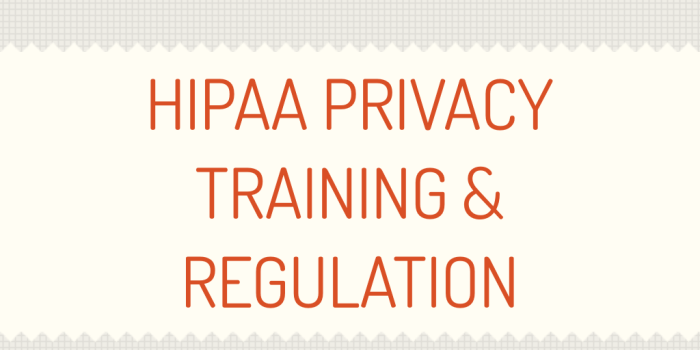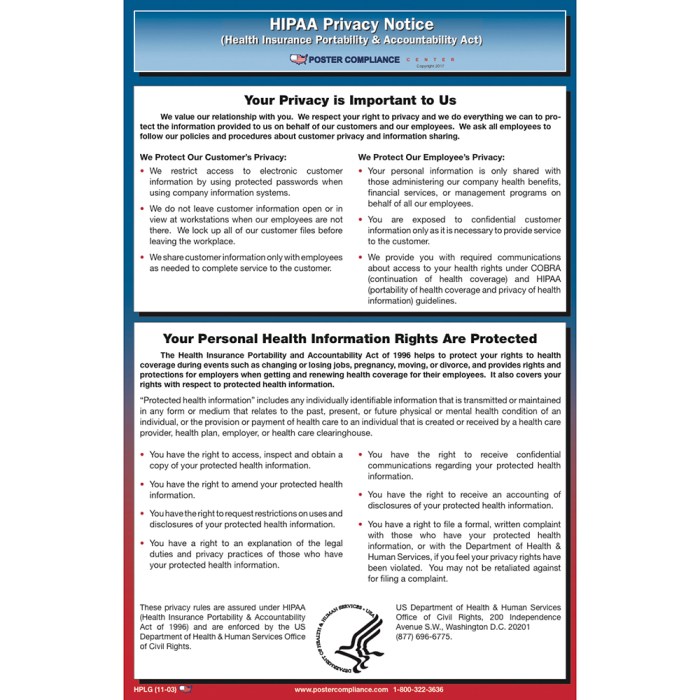The HIPAA and Privacy Act Training Challenge Exam is a comprehensive resource designed to help healthcare professionals understand the intricacies of the Health Insurance Portability and Accountability Act (HIPAA) and the Privacy Act. This exam provides a thorough overview of the key provisions of both laws, their similarities and differences, and the challenges healthcare organizations face in implementing and complying with them.
By successfully completing this exam, healthcare professionals can demonstrate their knowledge of HIPAA and the Privacy Act and their commitment to protecting patient privacy.
HIPAA and Privacy Act Overview

The Health Insurance Portability and Accountability Act (HIPAA) and the Privacy Act of 1974 are two federal laws that protect the privacy of health information.
HIPAA was enacted in 1996 to address the need for a national standard for the protection of health information. The Privacy Act was enacted in 1974 to protect the privacy of personal information held by federal agencies.
Both HIPAA and the Privacy Act contain provisions that protect the privacy of health information. However, there are some key differences between the two laws.
Similarities between HIPAA and the Privacy Act
- Both HIPAA and the Privacy Act protect the privacy of health information.
- Both laws require healthcare providers to obtain patient consent before using or disclosing their health information.
- Both laws provide patients with the right to access their health information.
- Both laws impose penalties for violations of the law.
Differences between HIPAA and the Privacy Act
- HIPAA applies to all healthcare providers, while the Privacy Act only applies to federal agencies.
- HIPAA contains more specific provisions for the protection of health information than the Privacy Act.
- HIPAA imposes more stringent penalties for violations of the law than the Privacy Act.
Examples of how HIPAA and the Privacy Act impact healthcare organizations
- HIPAA requires healthcare providers to implement privacy policies and procedures to protect the privacy of health information.
- The Privacy Act requires federal agencies to implement privacy policies and procedures to protect the privacy of personal information, including health information.
- HIPAA and the Privacy Act both require healthcare providers to obtain patient consent before using or disclosing their health information.
- HIPAA and the Privacy Act both provide patients with the right to access their health information.
- HIPAA and the Privacy Act both impose penalties for violations of the law.
Training and Education

HIPAA and Privacy Act training is essential for healthcare professionals to ensure that they are aware of their obligations under the law.
Importance of HIPAA and Privacy Act training for healthcare professionals, Hipaa and privacy act training challenge exam
- HIPAA and Privacy Act training helps healthcare professionals to understand their obligations under the law.
- HIPAA and Privacy Act training helps healthcare professionals to protect the privacy of health information.
- HIPAA and Privacy Act training helps healthcare professionals to avoid violations of the law.
Key topics that should be covered in HIPAA and Privacy Act training
- The key provisions of HIPAA and the Privacy Act
- The similarities and differences between HIPAA and the Privacy Act
- The impact of HIPAA and the Privacy Act on healthcare organizations
- The role of the Office for Civil Rights (OCR) in enforcing HIPAA and the Privacy Act
- The types of penalties that can be imposed for HIPAA and Privacy Act violations
- How to avoid HIPAA and Privacy Act violations
Best practices for developing and delivering effective HIPAA and Privacy Act training programs
- Use a variety of training methods, such as lectures, workshops, and online courses.
- Tailor the training to the specific needs of the healthcare professionals who will be receiving it.
- Provide opportunities for healthcare professionals to ask questions and get clarification on the material.
- Make sure that the training is up-to-date with the latest changes to HIPAA and the Privacy Act.
- Provide ongoing training to healthcare professionals to ensure that they are aware of their obligations under the law.
Challenges in Implementing HIPAA and the Privacy Act

Healthcare organizations face a number of challenges in implementing HIPAA and the Privacy Act.
Challenges healthcare organizations face in implementing HIPAA and the Privacy Act
- The complexity of the laws
- The cost of implementing the laws
- The lack of resources to implement the laws
- The need to balance the privacy of health information with the need to share information for treatment and research purposes
Examples of common HIPAA and Privacy Act violations
- Failing to obtain patient consent before using or disclosing their health information
- Disclosing health information to unauthorized persons
- Failing to protect health information from unauthorized access
- Failing to provide patients with access to their health information
Strategies for overcoming the challenges of implementing HIPAA and the Privacy Act
- Develop a comprehensive HIPAA and Privacy Act compliance plan.
- Train all healthcare professionals on the key provisions of HIPAA and the Privacy Act.
- Implement strong security measures to protect health information.
- Establish clear policies and procedures for the use and disclosure of health information.
- Monitor compliance with HIPAA and the Privacy Act on an ongoing basis.
Enforcement and Penalties

The Office for Civil Rights (OCR) is responsible for enforcing HIPAA and the Privacy Act.
Role of the Office for Civil Rights (OCR) in enforcing HIPAA and the Privacy Act
- The OCR investigates complaints of HIPAA and Privacy Act violations.
- The OCR takes enforcement action against healthcare providers who violate HIPAA and the Privacy Act.
- The OCR provides guidance to healthcare providers on how to comply with HIPAA and the Privacy Act.
Types of penalties that can be imposed for HIPAA and Privacy Act violations
- Civil penalties
- Criminal penalties
Guidance on how to avoid HIPAA and Privacy Act violations
- Develop a comprehensive HIPAA and Privacy Act compliance plan.
- Train all healthcare professionals on the key provisions of HIPAA and the Privacy Act.
- Implement strong security measures to protect health information.
- Establish clear policies and procedures for the use and disclosure of health information.
- Monitor compliance with HIPAA and the Privacy Act on an ongoing basis.
Emerging Trends in HIPAA and Privacy Act Compliance
There are a number of emerging trends in HIPAA and Privacy Act compliance.
Emerging trends in HIPAA and Privacy Act compliance
- The use of technology to improve compliance with HIPAA and the Privacy Act
- The increasing focus on patient engagement in HIPAA and Privacy Act compliance
- The growing importance of data security in HIPAA and Privacy Act compliance
New technologies and approaches that can help healthcare organizations comply with HIPAA and the Privacy Act
- Data encryption
- Data access management
- Patient portals
Best practices for staying up-to-date on the latest HIPAA and Privacy Act requirements
- Subscribe to OCR newsletters and updates.
- Attend HIPAA and Privacy Act conferences and webinars.
- Read HIPAA and Privacy Act-related articles and blog posts.
- Consult with a HIPAA and Privacy Act compliance expert.
User Queries: Hipaa And Privacy Act Training Challenge Exam
What is the purpose of the HIPAA and Privacy Act Training Challenge Exam?
The HIPAA and Privacy Act Training Challenge Exam is designed to help healthcare professionals understand the key provisions of HIPAA and the Privacy Act, their similarities and differences, and the challenges healthcare organizations face in implementing and complying with them.
Who should take the HIPAA and Privacy Act Training Challenge Exam?
The HIPAA and Privacy Act Training Challenge Exam is recommended for all healthcare professionals who want to stay up-to-date on the latest HIPAA and Privacy Act requirements.
How do I prepare for the HIPAA and Privacy Act Training Challenge Exam?
The best way to prepare for the HIPAA and Privacy Act Training Challenge Exam is to review the key provisions of HIPAA and the Privacy Act, as well as the challenges healthcare organizations face in implementing and complying with them.